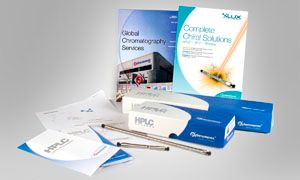Phenomenex launches chiral screening service
Phenomenex has announced a chiral screening service for customers in pharmaceutical and natural products research and development.

Phenomenex has announced a chiral screening service for customers in pharmaceutical and natural products research and development. According to the company, this free service provides target screening using a library of HPLC and SFC columns. After resolving the chiral compound, the company produces method development and optimization for the service customer within 10 business days.
Enantiomers of chiral compounds may have different pharmacological effects in biological systems. Regulations require that enantiomers of all chiral drugs in development be screened separately on their pharmacodynamic and pharmacokinetic properties.
“Resolving chiral compounds is relatively difficult, and column selection can be complicated,” explained Kari Carlson, the company’s brand manager, in a statement. “Our chiral screening service eliminates time-consuming guesswork and also gives customers a chance to ‘test-drive’ our columns.”
The company will customize a plan for each screening project, taking into account specific requirements and overall separation goals. Once a project is completed, the customer will receive a report that details the optimal method including information on the chiral stationary phase (CSP) selected for the separation, running conditions and associated chromatograms.
Customers can find more information at: http://www.phenomenex.com/chromatographyservices
LCGC’s Year in Review: Highlights in Liquid Chromatography
December 20th 2024This collection of technical articles, interviews, and news pieces delves into the latest innovations in LC methods, including advance in high performance liquid chromatography (HPLC), ultrahigh-pressure liquid chromatography (UHPLC), liquid chromatography–mass spectrometry (LC–MS), and multidimensional LC.
Using LC-MS/MS to Measure Testosterone in Dried Blood Spots
December 19th 2024Testosterone measurements are typically performed using serum or plasma, but this presents several logistical challenges, especially for sample collection, storage, and transport. In a recently published article, Yehudah Gruenstein of the University of Miami explored key insights gained from dried blood spot assay validation for testosterone measurement.